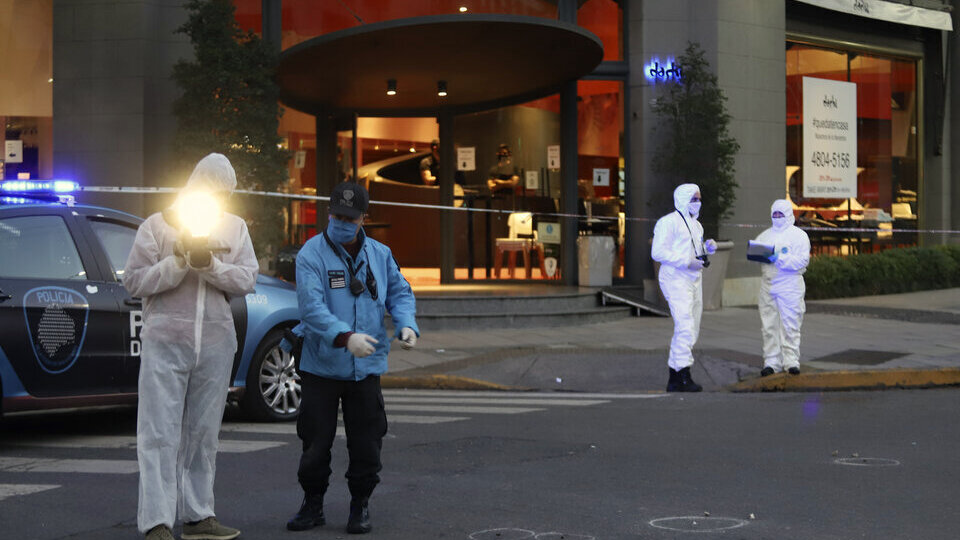
Psychiatrist George Monforte was acquitted in a case with high national impact. This is the death of police officer Juan Pablo Roldan, who was stabbed by psychiatric patient Rodrigo Facundo Rosa. That Monday, September 28, 2020, both the probation officer and the psychiatric patient died as a result of the incident. Roldan for stab wounds; Rose, because of Roldan’s shots. The charge against Monforte was more serious: that he did not properly attend to his patient —Abandonment of person following death— it led murder of the policeman. The prosecutor and the family sought an effective prison sentence for professional and lengthy disqualification Responsible for both deaths. However, Monforte was acquitted in a verdict that, according to his defense attorney, Vadim Missanchuk, “represents before and after psychiatric treatment.” Judge Carlos Rengel Mirad evaluated It was a case in the middle of the epidemic, although Monfort treated Rose several times in person, the patient stopped taking the medication, even managed the intervention of the psychiatric emergency service during the weekend of the crisis – there are private and the same psychiatric ambulances – but Rose calmed down. After a few hours, the next morning he came out and said, “I must kill them because they offend the gods.” In other words, a psychiatrist cannot take over during a crisis where emergency services must intervene. The Court of Cassation upheld this judgment.
A dramatic case
Monforte began treating Rose in 2014 and was diagnosed with “schizophrenia.” Treatment was very regular over the years and the family reported that Facundo – as they called him – was much improved in 2019. But then came the pandemic and everything got worse.
For the family, the process was very difficult. Facundo had no history of violence of the intensity of that Monday in September. He has recorded two visits to the US Embassy, once in Canada, in 2011 and once in Argentina. He shouted and delivered letters to Barack Obama and Donald Trump. At that time, he did it naked. Apart from that, no pushing, no insults, no shouting, no use of knives.
It didn’t just kill Ko
In 2020 everything became more difficult, first the psychiatrist Monfort underwent heart surgery in January, and then came the circulation restrictions. Also, the psychiatrist contracted Covid in August. Despite this situation, Monforte attended the Rose several times during the epidemic, with an in-person consultation on September 18, ten days before the tragedy.
The situation deteriorated sharply over the weekend of Sunday 29th and Monday 30th. Roja seems to have been in a sort of rage after she stopped taking the medicine, which made it very difficult for her mother – who lived with her – an old, widowed health problem to control. The judge considered it proven that Manfort spoke to the family several times on the phone, insisting on medication and offering to start prepaid procedures so that they would admit him to the hospital. “A psychiatrist who treats a patient sparingly cannot take responsibility when a crisis occurs,” explains lawyer Vadim Missanchuk. In this case, emergency services must intervene. And, it cannot be accepted as such. The judge himself says that the law requires two experts to decide. When a crisis occurs, mental health ambulances have a prepaid service or switch to the same problem.
What did the judge say?
Rosa’s family asked for a ten-year prison sentence and a long disqualification for Monfort, while lawyer Sandro Abraldes argued that the psychiatrist’s actions were not intentional, but reckless. Apraldus sought a three-year suspended sentence and eight disqualifications.
The judge acquitted Monfort with the following arguments:
* No abandonment of the person or recklessness or negligence. The psychiatrist intervened at all times and could not ignore the law regarding hospitalization in the absence of the patient’s consent.
* Psychiatrist has no responsibility for patient compliance in taking medication. “You can’t be on the pill every time,” the magistrate sums up
*Hospitalization is not Monford specific, it is group specific. Psychiatrist can contact the prepaid company and process the order. Family members halted the hospitalization process Sunday night after finding Facundo calm.
* Monforte was not required to be present that Sunday night as the emergency would have to be handled by emergency services. Also, Facundo left the house and his whereabouts are unknown.
* It is clear that the specialist took care of the patient during the epidemic.
* ”Before the unfortunate event – says the judge – there was no sign of such violence. Undressing, head shaking, inappropriate talking or pushing cannot be considered precursors of violence.
Trial judge Rengel Mirad’s ruling was upheld by the Cassation Chamber’s Gustavo Bruzon and Pablo Jantes last week. They felt that Roja’s family did not dispute the magistrate’s stand. A significant fact is that the complainants – Facundo’s mother and his brothers – should be exempted from paying the costs of the process, Judge Rengel Mirad considered “because the dramatic situation in which they made the request is understandable.”
Rengel Mirad concludes with the following conclusion: “Leave to the Ministry of Public Health the communication to the health authorities that they consider relevant regarding the shortcomings and irregularities of the health system mentioned by the witnesses.” In a word, relatives are forced to carry out procedures that delay the intervention of ambulances – long enough – when minutes are decisive and mean the difference between life and death.

“Introvert. Thinker. Problem solver. Evil beer specialist. Prone to fits of apathy. Social media expert. Award-winning food fanatic.”





More Stories
Ranking of the most powerful passports: what position Argentina occupies in the world and continent
Two US Air Force B-52H bombers arrive in Romania after being intercepted by Russian fighters.
Maduro sends troops to intimidate the enemy, but the soldiers want to see Maria Corina Machado: “Has the lady arrived?”